- Home
- McBain, Ed
Runaway Page 2
Runaway Read online
Page 2
“Well!” she said. “Who’s after you?”
“The cops,” Johnny said quickly.
She’d been smiling, but the smile dropped from her face now, as if her little joke had paid off in unforeseen dividends. Her foot stopped on the treadle of the machine. “What d’you mean, the cops? What for?”
“They say I killed Luis the Spic.”
“He dead?” Gussie asked. When he nodded she said, “Good. He deserved it.”
“Yeah, but I didn’t do it.”
“I din’t say you did. No matter who, he deserved it.”
Johnny glanced through the curtains and out at the street again. “I run away from them,” he said. “They was planning a run-through, and I don’t like working on a railroad.”
“You shouldn’t have run, man,” Gussie said. “That was stupid.”
“All right, it was stupid. You didn’t see their eyes.”
Gussie stared at him contemplatively for a few moments. “Why’d you come to me?” she asked.
“Just to get off the streets. You don’t have to worry. I’m leaving.” He said it more bitterly than he’d intended to.
“I don’t want no trouble with the bulls,” she said lamely.
“Nobody does.”
“Nor me especially.”
Johnny forced a smile. “Hell, you pay the cops off regular, anyhow.”
“That ain’t got nothin’ to do with it. I ain’t askin’ for trouble.”
“You want me to go right this minute?”
“I din’t say that.”
“Then stop bellyaching.”
Gussie’s face was worried now. She was thinking hard, Johnny could see, and there was a phone on the wall not three feet from them. Maybe he shouldn’t have come here after all. Maybe …
“What’re y’gonna do?” she asked.
“I don’t know. How do I know? Just stay away from them for now, that’s all.”
“And then what?”
“Somebody killed Luis,” he said. “That’s for sure.”
“They’ll catch you,” she said. “They’ll catch you, an’ you’ll wisht you was back in Georgia, boy.”
“I ain’t from Georgia,” Johnny said.
“You’ll still wisht you was back there. Man, you shun’ta run from them. That’s the worst thing you could’ve done.”
“I also slugged a cop and stole a pussy wagon. I got nothing to lose now.”
“You’re fixed up real fine, ain’t you?” she asked.
“Yeah,” he said dully.
They heard the front door open, and Johnny tensed.
“Who …”
“Shut up,” she hissed. “Stay back here. I’ll take care of it.”
He hugged the wall, and she parted the curtains and went out front.
“Afternoon, Gussie,” he heard a woman’s voice say.
“Afternoon, Mrs. Welles,” Gussie answered. “Cold enough out there for you?”
“Mm-mmmmuh,” Mrs. Welles said. “I come by to see if the corset was ready.”
“It sure is, Mrs. Welles. Finished it this morning. Just a moment, now, an’ I’ll get it for you.”
She parted the curtains again and came into the back of the shop. Johnny watched her as she checked the rows of cardboard boxes stacked on the long table. She selected one from the rest, turned, winked at him, and then went out front again.
“Here we are,” she said heartily.
“Uh-huh,” Mrs. Welles said, and Johnny could picture her nodding her head as she opened the box. “It looks very nice, Gussie, very nice. You mind if I try it on?”
“Well …” Gussie hesitated. “It’s kind of chilly in the back. I don’t want you catchin’ pneumonia. You try it on home, and if there’s anything to be changed, why, you just bring it right back. How’s that?”
“Well, all right,” Mrs. Welles said. She paused and then added, “If it’s all right with you, Gussie, I’ll pay you after I tries it on.”
“Any time you’re passing by,” Gussie said agreeably.
“Don’t know when that’ll be,” Mrs. Welles said. “Gettin’ so a body’s scared to walk the streets. You hear about Luis Ortega?”
“No,” Gussie lied.
“Shot to death about an hour ago.”
“No!” Gussie said.
“He was,” Mrs. Welles said. “Serves him right, I say.”
“Who shot him?” Gussie asked.
“Johnny Lane. You know Johnny Lane?”
“Well …”
“That’s right, he used to work for you, didn’t he? Well, him. He’s the one. He shot Luis.”
“Imagine that,” Gussie said.
“Serves Luis right. I don’t hold with no spics in Harlem, Gussie. Let ’em stay where they belong, I say.”
“Well …”
“Besides, I give him enough of my money, that one. ’Tween us, Gussie, I think he was runnin’ a crooked numbers game. Oh, I know they’s folks say they hit from Luis, but I don’t know of any personally, do you? I say it’s good he got it.”
“Have the police caught Johnny yet?” Gussie asked.
“I mind my own business when it comes to the cops,” Mrs. Welles said. “They just itching for an excuse to pick you up on something.” She paused and cleared her throat. “But I don’t think they got him yet. Leastways, they took in his girl, Cynthia Matthews. You know her?”
“Yes, I know her,” Gussie said slowly.
“Yeah, well, they got her down to headquarters. I guess they figure she may know something about it.” Mrs. Welles sighed deeply. “I got to run home, Gussie. Now you sure this’ll fit me?”
“Like a glove,” Gussie promised.
“But will it fit like a corset?” Mrs. Welles asked, and then burst out laughing, convulsed by her own humor. She kept laughing until she walked out of the store, and Johnny relaxed only when he heard the door close. Gussie parted the curtains and stomped into the back room.
“That old bitch,” she said. “I’ll never see that money now.”
“Why not?” Johnny asked.
“She won’t come in again till this one’s ready to fall off her bones. And by that time she’ll have forgotten the bill. Goddamn!”
“Why’d you let her go, then?”
“Because she wanted to try the damn thing on. Suppose she’d come back here?”
“Oh,” Johnny said.
“Yeah, oh.”
“Look, I’ll cut out,” he said. “I don’t want to cause you any—”
“Stay until dark,” Gussie said suddenly. “Stay here in the back. When it gets dark, you can go.”
“Thanks,” he said.
“I’m only savin’ my own skin. If the cops think—”
“Don’t spoil it,” Johnny said. “I was beginning to think you were human.”
“Go to hell,” Gussie said, but she was smiling.
She went back to the machine, and Johnny watched her as she set it in motion.
“I wonder what they’re doing to Cindy,” he said.
“Nothin’. Few questions, then they’ll let her go.”
“She don’t know anything about it,” he said.
“They’ll let her go, don’t worry.”
“I ain’t worryin’,” he said. “They jus’ better let her go.”
“They will.”
“This’s just gonna kill Molly, you know that, don’t you?
“She’ll survive,” Gussie said. “Long as you din’t shoot Luis, Molly’ll get over it.”
“I didn’t shoot him,” Johnny said.
“I know. So don’t worry.”
“You suppose they’ll drag Molly into this, too?”
“I s’pose.”
“Man, what gets me is I didn’t do nothin’,” Johnny said. “I mean, all this running, and—”
“Why don’t you go to the cops?”
“You kidding?”
“If you din’t shoot him—”
“I didn’t.”
“
Then you got nothin’ to be scared of.”
“No, nothin’,” Johnny said, pulling a face. “You think they care who shot that bastard? Long as their record’s clean again, they don’t give a damn.”
“I s’pose,” Gussie said philosophically. “Now shut up so I can get some work done.”
He saw the lights come on in the shops across the avenue, saw the street lamps throw their feeble yellow rays into the gathering November darkness. The clock on the wall in Gussie’s front room read five-ten. The lights all along the avenue were on now, building a solid cozy front against the crisp near-winter blackness.
“You’d better get started,” she said. “We’re lucky they haven’t been here yet.”
“I ditched the car on Pleasant,” he told her. “They probably figure I’m mingling with the wops.”
“Go through the back way,” Gussie said. “You can cut through the yard and climb the fence. That way you’ll come out on a Hun’ thirty-eighth. Less lights.”
“All right,” he said. He hesitated, biting his lip.
“What’s the matter?”
“Nothing.”
“You scared?”
“A little.”
“You got money?”
“A little.”
Gussie walked to a chair and unhooked a black leather purse from where it hung. “This’ll help a little,” she said. “Things ain’t been too good lately.”
She handed him the sawbuck, and he hesitated before taking it. “You don’t have to …”
“Luis broke my window once,” she said simply.
“Well, thanks, Gussie. Thanks a lot.”
She nodded, and he left by the back door, cutting into the concrete alleyway behind the apartment building. He avoided the garbage cans stacked for the night, walked alongside the wooden fence partitioning this house from the one alongside it. A woman up on the fourth floor slammed open a window and put something on the fire escape. He huddled against the brick of the building until he heard the window go down again, and then he broke into a run. The clotheslines stretched overhead, flapping their garments like frozen ghosts. He reached the high green fence at the side of the house, scaled it, and dropped to the concrete on the other side. He ran through behind the house fronting on 138th Street, and then into the alley. He saw the garbage cans ahead. He knew there would be steps now leading to the sidewalk. He remembered the times when he and the other kids used to duck down behind the steps like this on his own block, whenever they were too busy or too rushed to look for a toilet.
He passed the garbage cans, and the familiar sharp stench assailed his nostrils. It was dark there where the steps dropped down into the bowels of the tenement. He saw the iron railing up ahead of him on the sidewalk, and the dangling chain that was supposed to stop kids from parading up and down the steps, but which only served as an impromptu swing. He started up the steps, and when he collided with the other man, he almost shrieked in terror.
He heard a dull clatter as something dropped to the steps and then rolled away into the blackness near the garbage cans. His fists balled immediately, and he waited, hearing the other man’s hoarse breathing. He figured the guy for a wino or a stumblebum, or maybe a degenerate. He’d run across one when he was a kid once, scrambling down under the steps for bottle tops. He’d run like a bastard then, while the degenerate stood there with his clothes all open, cursing at him wildly.
“You sonovabitch,” the man said. He could still not see his face. He heard only the hoarse breathing, saw only the dim outline of the man in the feeble glow of the street light that filtered down onto the steps below the building.
“Where’d it go? the man asked.
“Where’d what go?” he heard himself answer.
“You sonovabitch,” the man said again. He pushed past Johnny, dropped to his hands and knees, and began scrambling around near the garbage cans. Johnny looked at him for a moment and then thought, What the hell am I standing around for? He started up the steps, heard the sudden movement behind him, and then felt the wiry fingers clamp onto his shoulder.
“Just a second, punk,” the man said. If you broke that goddamn syringe, then you’re going to pay for it.” He pulled Johnny back down the steps, and Johnny stumbled and dropped to his knees.
“Just stick around,” the man said. “You ain’t going no place till we see the damage you done.”
“Look, Mac …”
“Don’t Mac me, bud. Just keep your mouth shut till I find that syringe. You think syringes grow on trees? I had to swipe this one from a doctor’s bag.”
Johnny got up and moved toward the steps again, and the man slammed him back against the wall. He was a big man, with arms like oaks and a head like a bullet. His eyes gleamed dully in the darkness. “I said stay where you are,” he warned.
He shoved Johnny back into the alley, blocking him from the steps, and then he reached down for something that glittered near one of the garbage cans.
“You did it, you bastard,” he said. “You broke the mother-lover.” Johnny saw the jagged shards of the syringe in the man’s open hand. And then the fingers of the hand closed around the syringe, hefting it like a knife, with the glass ends crooked and sharp.
“You shouldn’t have been shooting up down here,” Johnny said lamely. “I didn’t even see you. I—”
“How much money you got, man?”
“Nothing,” Johnny lied. He had the ten Gussie had given him, plus two of his own, but he sure as hell wasn’t going to give it to a goddamn hophead with a broken hypo.
“Suppose we see,” the man said, advancing with the broken shards of the syringe ahead of him.
Johnny lashed out with his right fist, catching the man solidly on his chest. The man staggered back, raising the hand with the syringe high. The street light caught the syringe, gave it up to the darkness again as it slashed downward and up. Johnny felt the ragged glass ends when they struck his wrist. He tried to pull his hand back, but the biting glass followed his arm, ripping the thin sleeve of his coat, gouging through his Eisenhower jacket, the jacket his brother had brought home from the last war. The glass ripped skin clear to his elbow, and he felt the blood begin pouring down his arm, and he cursed the addict, and brought back his left hand balled at the same time, throwing it at the addict’s head.
He felt his knuckles collide with the bridge of the bastard’s nose, felt bone crush inward, and then the face fell away and back, slamming down against the concrete with the syringe shattering into a thousand brittle pieces now, now that it was too late. He stepped around the hophead, and the hophead moved, and Johnny kicked him in the left temple, wanting to knock his head clear off.
There was a pain in his arm, and the blood had soaked through the sleeves of his jacket and coat. He touched the arm and felt the blood, and when his hand came away sticky he felt a twinge of panic.
He stood at the base of the steps, wanting to kill the addict, wanting to really kill him. He had not felt this way even when he’d tangled with Luis that day outside the Apollo. It was one thing to be on the run, but it was another to have your arm all slashed to mincemeat, and he had the hophead to thank for that.
He kicked the bastard again, happy when he heard the sound of his shoe thudding against bone.
What do I do now? he wondered. How do I get through the streets with my arm running blood like this?
He needed a doctor, but a doctor was out. What about Cindy? No, not Cindy, because the cops would sure as hell be watching her now, especially after they picked her up for questioning. Goddamnit, how did I get into this? How, how …
No doctor, and no Cindy. What about a druggist? What about Frankie Parker, who worked for Old Man Lefkowitz? What about him? Did Frankie owe him a favor?
No, Frankie did not owe him a favor. But they’d grown up together, had lighted bonfires together on Election Eve, had thrown snowballs together, had roasted spuds together in the empty lot behind Davis’ Grocery, had celebrated together every time Louis won a
fight, had gone down to the Market together for the first time. Frankie owed him nothing, but what the hell, you grow up with a guy, you figure maybe a guy will do you that kind of a favor when your arm is running off into the gutter.
Maybe yes, and maybe no, but Frankie Parker was the only one to see, the Lefkowitz’s drugstore was right on Seventh Avenue and only a few blocks down. He took his handkerchief from his pocket and wadded it into the sleeve of his jacket, near the elbow, where he figured it would stop the most blood. He looked down at the addict then, and he said, “You rotten bastard,” and then he climbed the steps, straddled the chain, and stepped onto the sidewalk.
Three
The bell over the front door of the drugstore sounded loudly in the warm, antiseptic stillness.
Frankie Parker turned from the toiletries counter and saw Johnny entering the store, and he swallowed hard.
“Johnny!” he said, and then he lowered his voice and said, “Johnny,” in a whisper, as if he were afraid of being overheard.
“Let’s go in the back,” Johnny said.
“Look, Johnny, you shouldn’t have come here. The cops—”
“It’s sure spreading fast, ain’t it?” Johnny said. “Come on. In the back.”
“Johnny, why’d you come here? You want to get me in trouble?”
“No, I don’t want to get you in trouble,” Johnny said wearily.
“Then why’d you come here? Man, you should’ve had more sense than that. Don’t you know—”
“I want my arm bandaged. And something to stop the pain.”
“What do you mean? What do you mean, you want …” Frankie looked at the bleeding arm, and then closed his eyes. He seemed about to get sick for a moment. He clutched the counter and asked, “How … how’d that happen? You … you kill somebody else, Johnny?”
“I ain’t killed nobody yet. Look, Frankie, fix it for me, will you? You work in a drugstore, you know the ropes. Just a bandage, and something smeared on the cut, that’s all.”
“I’m not a doctor, Johnny. I’m only a pharmacist.”
“You can fix it.”

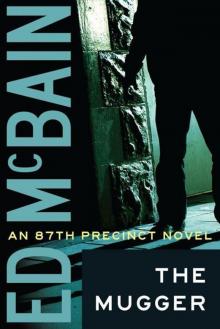 87th Precinct 02 - The Mugger
87th Precinct 02 - The Mugger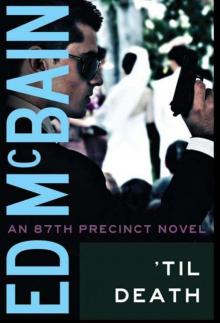 87th Precinct 09 - Til Death
87th Precinct 09 - Til Death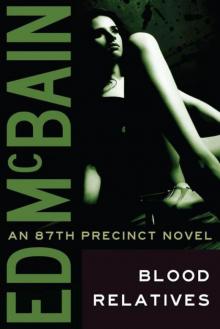 Blood Relatives (87th Precinct)
Blood Relatives (87th Precinct) Killer's Payoff
Killer's Payoff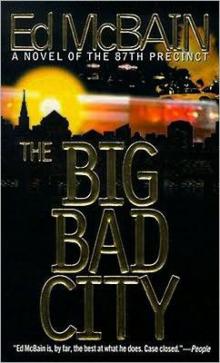 The Big Bad City
The Big Bad City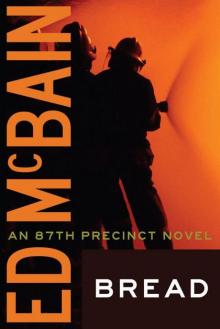 Bread (87th Precinct)
Bread (87th Precinct)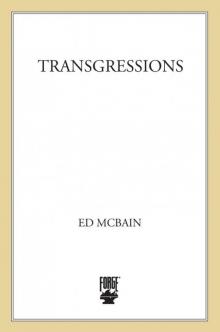 Transgressions Vol. 3
Transgressions Vol. 3 Runaway
Runaway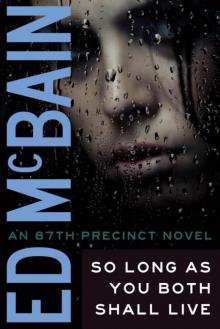 So Long As You Both Shall Live (87th Precinct)
So Long As You Both Shall Live (87th Precinct)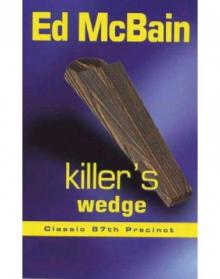 Killer's Wedge
Killer's Wedge